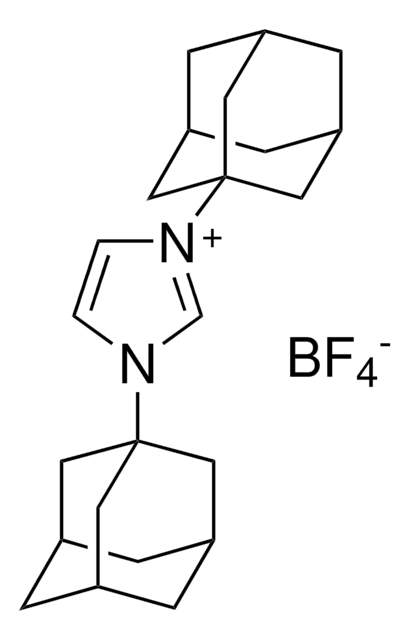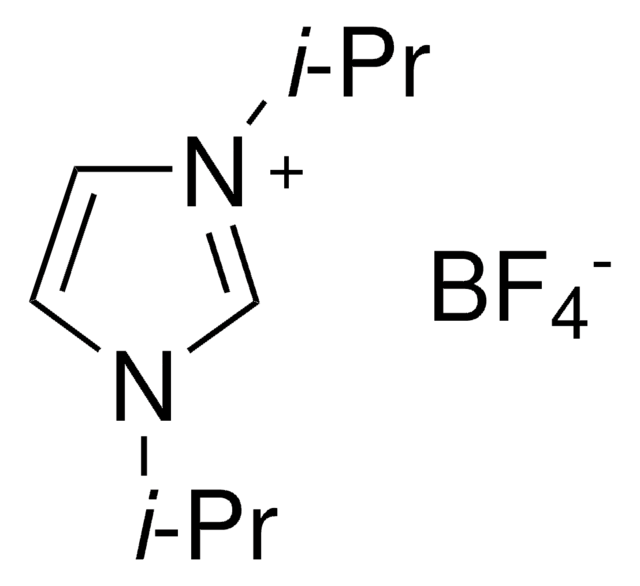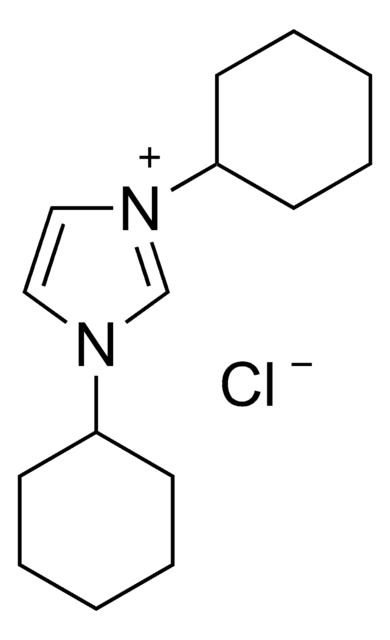696188
1,3-Bis(2,4,6-trimethylphenyl)-1,3-dihydro-2H-imidazol-2-ylidene
97%
Synonym(s):
1,3-Bis(2,4,6-trimethylphenyl)imidazol-2-ylidene
About This Item
Recommended Products
Quality Level
Assay
97%
form
powder
reaction suitability
reagent type: catalyst
mp
140 °C
storage temp.
−20°C
SMILES string
Cc1cc(C)c(N2[C]N(C=C2)c3c(C)cc(C)cc3C)c(C)c1
InChI
1S/C21H24N2/c1-14-9-16(3)20(17(4)10-14)22-7-8-23(13-22)21-18(5)11-15(2)12-19(21)6/h7-12H,1-6H3
InChI key
JCYWCSGERIELPG-UHFFFAOYSA-N
Application
It can be used to synthesize:
- IMes ligated-rhodium complex as a catalyst for the selective hydrogenation of substituted aryl and heteroaryl boronate esters to cis-substituted borylated cycloalkanes.
- IMes/ruthenium complex (Cp*Ru(IMes)Cl)(Cp* =η5-C5Me3) as a catalyst for olefin ring closing metathesis reaction.
IMes is also used as an ancillary ligand in Pd-catalyzed Suzuki-Miyaura cross-coupling reaction between aryl chlorides or aryl triflates and arylboronic acids.
Signal Word
Warning
Hazard Statements
Precautionary Statements
Hazard Classifications
Eye Irrit. 2 - Flam. Sol. 2 - Skin Irrit. 2 - STOT SE 3
Target Organs
Respiratory system
Storage Class Code
4.1B - Flammable solid hazardous materials
WGK
WGK 3
Flash Point(F)
Not applicable
Flash Point(C)
Not applicable
Personal Protective Equipment
Certificates of Analysis (COA)
Search for Certificates of Analysis (COA) by entering the products Lot/Batch Number. Lot and Batch Numbers can be found on a product’s label following the words ‘Lot’ or ‘Batch’.
Already Own This Product?
Find documentation for the products that you have recently purchased in the Document Library.
Customers Also Viewed
Our team of scientists has experience in all areas of research including Life Science, Material Science, Chemical Synthesis, Chromatography, Analytical and many others.
Contact Technical Service







![2-Mesityl-5-methylimidazo[1,5-a]pyridinium chloride 97%](/deepweb/assets/sigmaaldrich/product/structures/495/055/5d86d2cc-b538-4586-9e2c-9e0d870826a7/640/5d86d2cc-b538-4586-9e2c-9e0d870826a7.png)



![Chloro[1,3-bis(2,4,6-trimethylphenyl)imidazol-2-ylidene]gold(I) 95%](/deepweb/assets/sigmaaldrich/product/structures/154/609/370330fe-5c15-47b6-ad13-ea3dc87099d6/640/370330fe-5c15-47b6-ad13-ea3dc87099d6.png)



